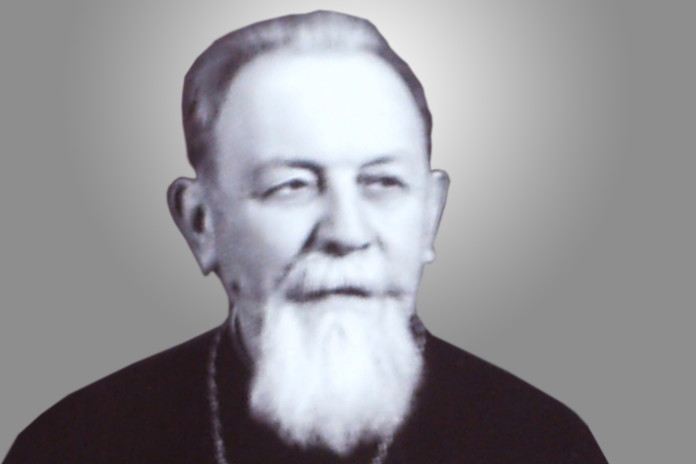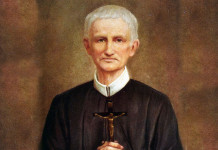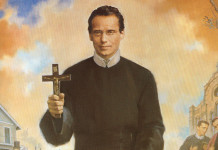Vasyl Vsevolod Velychkovskyi was born on 1st June 1903, in Stanislaviv (now Ivano-Frankivsk) to a family of the Velychkovskyi’s and Teodorovych’s, both of which had had a long tradition of priests in their families. Vasyl’s parents, Volodymyr and Anna, brought up their children in a spirit of Christian devotion. That is why Vasyl had a desire to work for the salvation of souls since his very childhood.
Vasyl Velychkovskyi received his gymnasium education in the town of Horodentsi. Being an ardent patriot, the fifteen-years-old gymnasium student joined the Ukrainian Galician Army to fight for the independence of his motherland during World War I. After his safe return from the army in 1920, Vasyl Velychkovskyi entered the Lviv seminary. In 1924, he was ordained a deacon by Metropolitan Andrey Sheptytskyi. It was at that time that Velychkovskyi discovered his monastic vocation. With assistance from his aunt Monica, he joined the Redemptorist novitiate and a year later, on 29 August 1925, he professed the vows of poverty, chastity and obedience. Since Velychkovskyi had already completed his theological studies, he was ordained a priest by Bishop Y. Botsian immediately after completing the novitiate, on the 9th of October of the same year.
From the very beginning of Fr. Velychkovskyi’s monastic life, his superiors noticed his talent as a missionary. In order to develop this talent, after Fr. Velychkovskyi spent two years teaching at the Redemptorist gymnasium “Juvenate”. He was also sent to Stanislaviv to conduct missions together with his more experienced confreres. This was the beginning of Fr. Velychkovskyi’s apostolic work, which lasted for 20 years – until the beginning of the persecution of the Ukrainian Greek Catholic Church.
On 16 November 1928 Fr. Velychkovskyi arrived at the Redemptorist monastery in Kovel. There, he immediately became involved in missionary work among the Galician settlers, scattered throughout the Volhyn, Pidliashshia, Kholm and Polissia regions, who had departed from the Greek-Catholic Church and joined the Russian Orthodox Church. Along with this work among the Galician settlers, Fr. Velychkovskyi also organized missions for the local population of Volhyn, Polissia, and Belarus. Using financial support from Metropolitan Sheptytskyi and other sponsors, he founded several churches and chapels. In 1935 Fr. Velychkovskyi returned to the Stanislaviv monastery and became superior there.
Fr. Velychkovskyi continued his apostolic activity on a large scale, even though the Greek Catholic Church underwent persecution at the hands of the Soviets after their occupation of Western Ukraine in 1939. In 1940 he organized a procession in which some 20 thousand faithful participated carrying crosses through the streets of Stanislaviv,. Despite the threats from Soviet secret police, Fr. Velychkovskyi did not give up. In 1941, on Metropolitan Sheptytskyi’s request, he departed for Central Ukraine to work with the Orthodox Ukrainians of Kamianets-Podilskyi. However, the pro-Ukrainian activities of the new priest caused suspicion among the Germans who had recently occupied the town. Just three days after his arrival, Fr. Velychkovskyi was accused of cooperating with Ukrainian national resistance organizations and was ordered to leave the town in twenty-four hours. He moved to Ternopil and became superior of the Dormition church monastery in that town.
Having seized Galicia for the second time in 1945, the Soviet regime in just one night of 10-11 April arrested representatives of the entire Greek-Catholic hierarchy. On 26 July 1945 Fr. Vasyl Velychkovskyi was arrested in Ternopil – “for anti-Soviet propaganda”. During the interrogation, he was offered the option of joining the Russian Orthodox Church in exchange for his freedom. The answer was: “Never!” Later Fr. Velychkovskyi was transferred to Kiev prison, where the investigation of his case lasted for almost two years. Finally, the Kiev regional court sentenced him to death – for two anti-communist phrases (“red horde” and “red gang”) which occurred in a pocket calendar issued by Fr. Velychkovskyi in Stanislaviv in 1939.
During the three months spent in a death row cell, Fr. Velychkovskyi continued performing his duties of a priest. He taught prisoners to pray; he instructed them on the truths of Christian faith and prepared them for receiving the Holy Sacraments. He led them to the doors of heaven. Finally, the night came when the guards led Fr. Velychkovskyi out of his cell. However, they did not go downstairs, to the place of execution, but upstairs, to the office of the prison administration. There, Fr. Velychkovskyi was informed that his death sentence was changed to a ten-year prison term.
In the first two years of his term Fr. Velychkovskyi was in a prison camp in the Kirovsk region; later, he was transferred to the Vorkuta mines. Despite the exhausting work, Fr. Velychkovkyi celebrated the Liturgy almost every day – using tins for liturgical accessories. “That tin” – says Metropolitan Hermaniuk – “was his chalice, his dyscos, his altar, his church … and nothing was able to destroy his church, for it was [based on his] strong conviction and God’s grace”. Several months before his release, Fr. Velychkovskyi’s fellow prisoner friends managed to arrange for him to work in the prison hospital rather than in the mines. This change saved his life – for his health had been ruined by ten years of imprisonment and exhausting labour. On 9 July 1955 Fr. Velychkovskyi was released.
After his return to Lviv Fr. Velychkovskyi did not find any church or chapel where he could serve, but this did not discourage him. He occupied a small room in number 11 Vozzyednannia Street. Here, he built an altar out of empty cardboard boxes. The faithful visited Fr. Velychkovskyi in groups of five or six to participate in Liturgies. During the period of the Greek-Catholic Church’s underground existence, he was not afraid to celebrate daily Liturgy, to conduct spiritual exercises, and to provide spiritual leadership for many devoted Christians. In 1959 the Apostolic See appointed Fr. Vasyl Velychkovskyi a bishop of the “Silent Church”; because of a complicated situation in the Soviet Union, his Episcopal ordination became possible only four years later.
The ten-year-long imprisonment did not “correct” or change Bishop Velychkovskyi. He continued “spreading anticommunist propaganda among the people, did not participate in socially-useful work, did not perform the duties of a Soviet citizen; he wrote a book about the icon of Our Lady of Perpetual Help, wherein attempts were made to prove through specific examples that atheists cannot be good citizens; he listened to Vatican radio broadcasts”. This list was sufficient to justify a new arrest of Bishop Vasyl Velychkovskyi on 2 January 1969. This time the imprisonment lasted for three years; the term was served in Kommunarsk near Donbass and was the cause of severe heart disease for Bishop Velychkovskyi.
On 27 January 1972, the second term of imprisonment was over. This time bishop Velychkovskyi was not allowed to return to Lviv; instead, he was sent to Yugoslavia for “recreation”. He used this opportunity to visit his sister in Zagreb and then Bishop Velychkovskyi departed for Rome, where he met Patriarch Yosyf Slipyi. He also had a private conversation with Pope Paul VI. Shortly afterwards, following the invitation of Metropolitan Maksym Hermaniuk, Bishop Velychkovskyi visited Canada.
Unfortunately, his visit to the Ukrainian diaspora in Canada did not last for long. Bishop Velychkovskyi died on 30 June 1973 at the age of 70 having served as a bishop for 10 years. Although his heart became silent in his body, it continues to sound in our souls: “Fear none of those things which thou shall suffer: behold, the devil shall cast some of you into prison, that ye may be tried; and ye shall have tribulation ten days: be thou faithful unto death, and I will give thee a crown of life” (Rev 2,10).
Taking into account the testimonies of Bishop Vasyl Velychkovskyi’s virtuous life, and particularly his endurance, courage and faithfulness to Christ’s Church during the period of persecution, the beatification process was started on the occasion of the Jubilee Year. On 2 March 2001, the process was completed on the level of the eparchy, and the case was handed over to the Apostolic See. On 6 April 2001, the theological committee recognized the fact of bishop Velychkovskyi’s martyrdom. On 23 April his martyrdom was verified by the Assembly of Cardinals, and on 24 April 2001 Most Holy Father John Paul II signed a decree of beatification of Bishop Vasyl Velychkovskyi, a blessed martyr of our Christian faith.
Prayer in Honor of the Redemptorist Ukrainian Martyrs
O Lord, our God, you call all to believe in you and to follow your way. We thank you for the grace you gave to Nicholas Charnetsky, Vasyl Velychkovsky, Zenon Kovalyk, and Ivan Ziatyk and to all their spiritual companions, such that they were able to pay the ultimate price of faithfulness to you in giving their lives.
We thank you for glorifying them in your heavenly kingdom, that they may be for all of us a shining example of your powerful presence in our lives. We pray that you give us the grace of faithfulness and generosity as we seek to respond to your love. Through their intercession, help us always to stand firm in the Truth and be faithful to you and your commandments.
O Holy Mother of God and our Mother of Perpetual Help, lead us to your Son, Jesus. Give us the courage to follow him always. We place ourselves under your protection.
For all the glory and honour belong to you, Almighty Father, Eternal Son, and Life-giving Spirit, now and forever and ever. Amen.






